Understanding Chicago
Moderator: Capos
Re: Understanding Chicago
It is interesting to note that the so-called O'Banion gang wasnt an "Irish" gang at all but instead it was the most multi-ethnic gang in Chicago at the time with O'Banion an Irish guy followed by Moran a French/Canadian, Alterie a French guy, Vincent Drucci a Sicilian, Henry Finklstein, Barney Bertsche, Maxie Eisen, Sam Morton and the Gusenbergs were all Jewish, Hymie Weiss a Polack, Frank Foster a Romanian guy etc.
Do not be deceived, neither the sexually immoral, nor idolaters, nor adulterers, nor men who practice homosexuality, nor thieves, nor the greedy, nor drunkards, nor revilers, nor swindlers will inherit the kingdom of God - Corinthians 6:9-10
Re: Understanding Chicago
Anyone been keeping up on Fosco's new posts?
Re: Understanding Chicago
Disagree with you bud. Accardo picked every boss after him until carlisi, battaglia, Milwaukee phil, cerone, aiuppa, we’re all accardo. Of course unless you have something to prove me wrong and I’m not being an ass I’m being serious you are very researched and I learn stuff from you among others
Ps not trying to start a pogo/wiseguy love affair Just giving props to people that actually do research instead of people that regurgitate stuff that was proven wrong years ago
I agree with phat,I love those old fucks and he's right.we all got some cosa nostra in us.I personnely love the life.I think we on the forum would be the ultimate crew! - camerono
Re: Understanding Chicago
Baby birds survive because their mothers regurgitate food into their mouths. Everything has its place in nature and everything has its place in this thread, especially if we're going to outpace the Buffalo-Ontario thread. We have at least a few baby birds on the board who might enjoy the discussion. I've enjoyed it, too, and both you and Villain have contributed to that. Love it up.
--
There was a Lucchese made member who began cooperating with the FBI relatively early and appears to have been a longtime member. He became close to John Roselli in prison in, I believe, the 1940s and maintained a friendship with him over the years. He said Roselli had previously been the underboss of the Los Angeles family. This might be better suited for an LA thread, but I don't believe the LA sources have ever described Roselli as the underboss in LA, though every source agrees he was more or less the most influential member of the family.
Even after Roselli transferred back to Chicago, he was considered more of a leader in the Los Angeles family than the actual boss Desimone and underboss Licata. Members sources say that Roselli was pushed as one of the top figures to become LA boss or even boss of a state-wide California mafia family if a couple of conspiracies had been put into motion. Roselli's legal troubles hampered this, among other factors.
I can't be sure, but I'm not sure the Lucchese source was right about Roselli being underboss in LA. Still, on an operational level, sources like Fratianno, Piscopo, and Fratianno all agree that Roselli had the stature of a powerful underboss, even a boss, when he was technically "just" a soldier. Even as a Chicago soldier. An example, too, of how influence and stature don't always correspond to formal rank.
--
There was a Lucchese made member who began cooperating with the FBI relatively early and appears to have been a longtime member. He became close to John Roselli in prison in, I believe, the 1940s and maintained a friendship with him over the years. He said Roselli had previously been the underboss of the Los Angeles family. This might be better suited for an LA thread, but I don't believe the LA sources have ever described Roselli as the underboss in LA, though every source agrees he was more or less the most influential member of the family.
Even after Roselli transferred back to Chicago, he was considered more of a leader in the Los Angeles family than the actual boss Desimone and underboss Licata. Members sources say that Roselli was pushed as one of the top figures to become LA boss or even boss of a state-wide California mafia family if a couple of conspiracies had been put into motion. Roselli's legal troubles hampered this, among other factors.
I can't be sure, but I'm not sure the Lucchese source was right about Roselli being underboss in LA. Still, on an operational level, sources like Fratianno, Piscopo, and Fratianno all agree that Roselli had the stature of a powerful underboss, even a boss, when he was technically "just" a soldier. Even as a Chicago soldier. An example, too, of how influence and stature don't always correspond to formal rank.
- motorfab
- Full Patched
- Posts: 2729
- Joined: Sat Aug 12, 2017 2:07 am
- Location: Grenoble, France
- Contact:
Re: Understanding Chicago
In The Last Mafioso, Weasel describes Roselli as a soldier directly under Dragna. It seems more logical to me than this underboss story
Re: Understanding Chicago
Pete wrote: ↑Mon May 18, 2020 10:28 pmDisagree with you bud. Accardo picked every boss after him until carlisi, battaglia, Milwaukee phil, cerone, aiuppa, we’re all accardo. Of course unless you have something to prove me wrong and I’m not being an ass I’m being serious you are very researched and I learn stuff from you among others
Ps not trying to start a pogo/wiseguy love affair Just giving props to people that actually do research instead of people that regurgitate stuff that was proven wrong years ago
You are forgetting by that time Ricca was the top boss not Accardo. Some time ago we had a discussion about this...
viewtopic.php?f=29&t=3797&p=86757&hilit=Giancana#p86757
Heres some additional stuff....
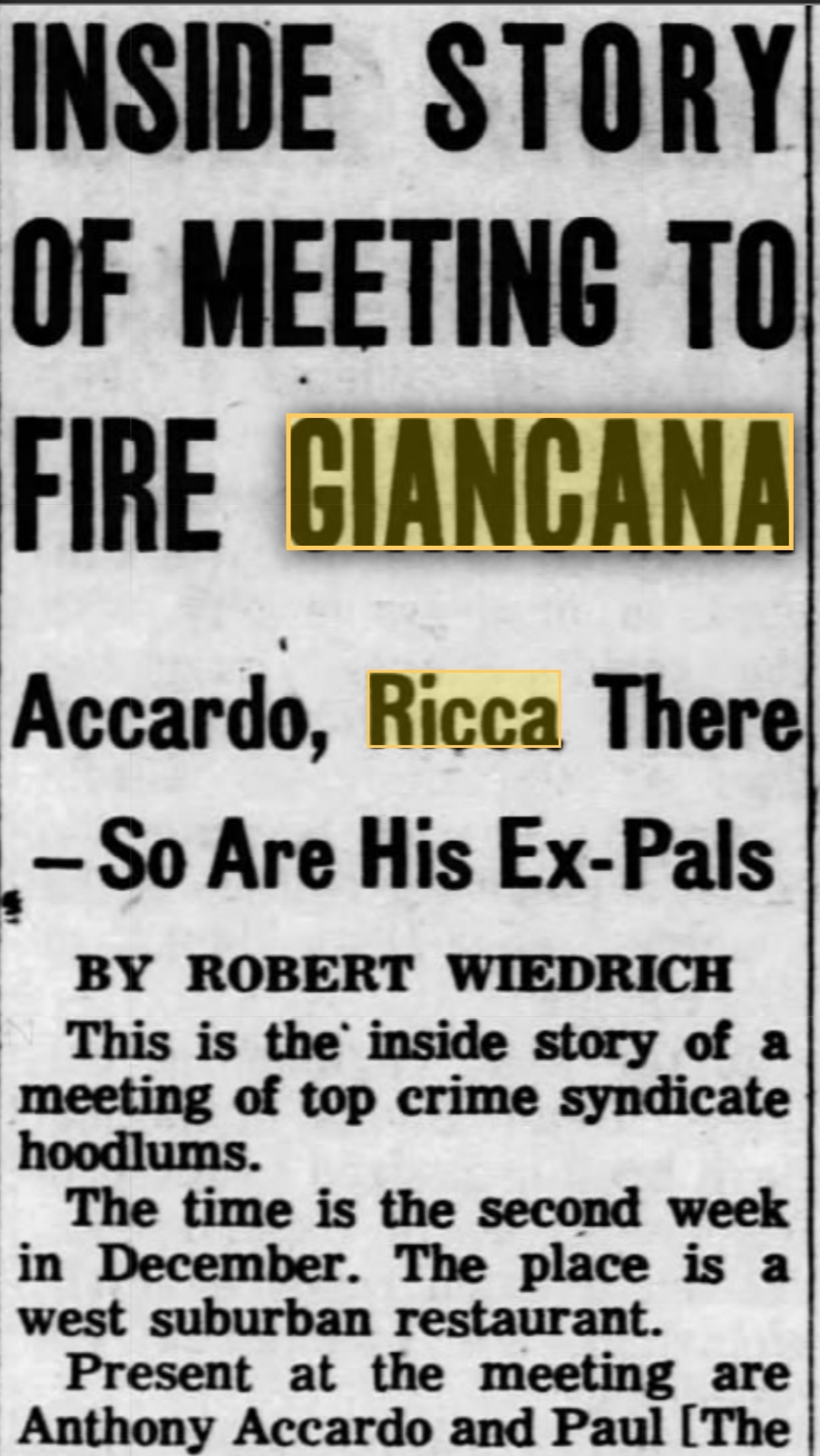
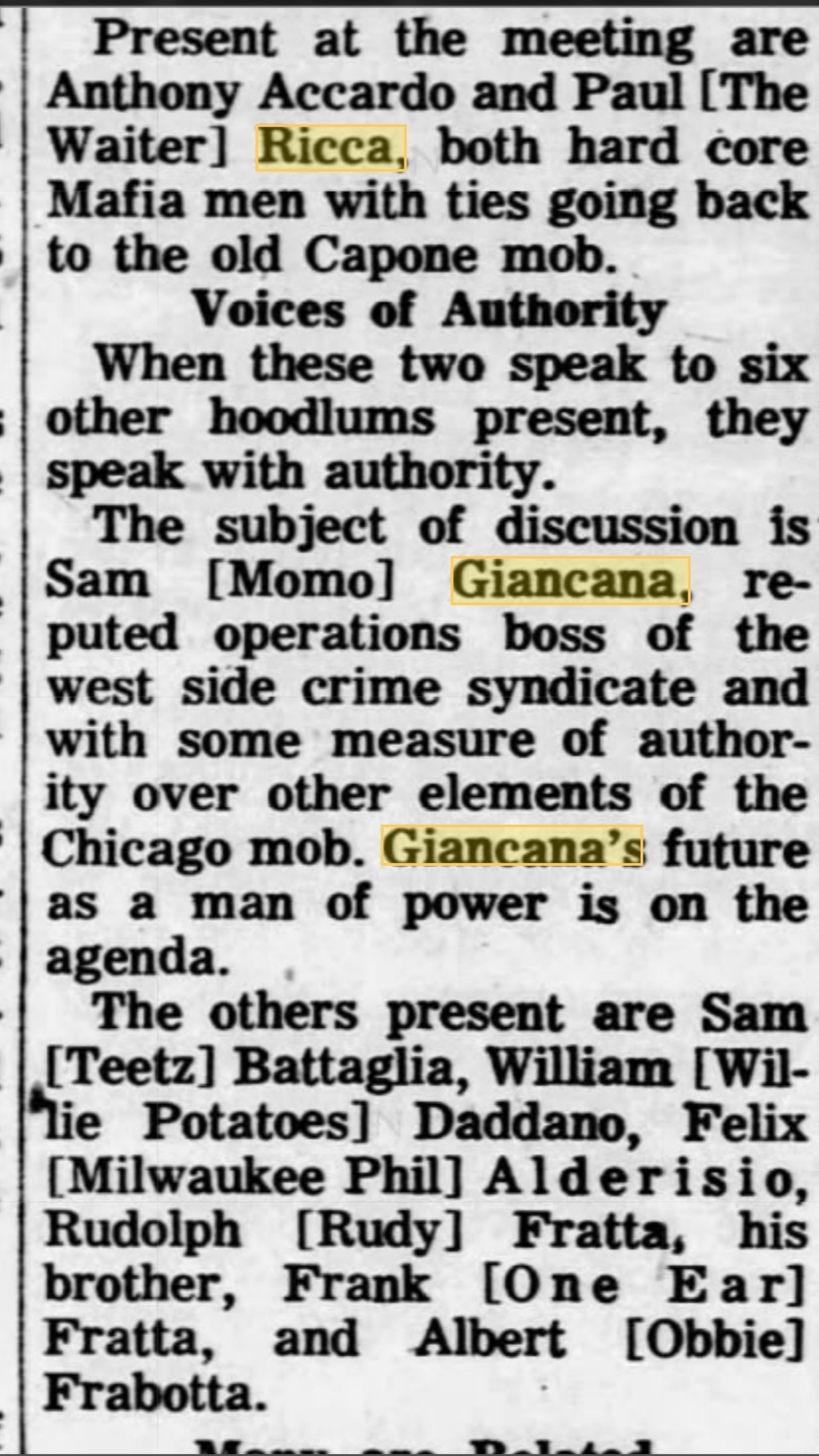
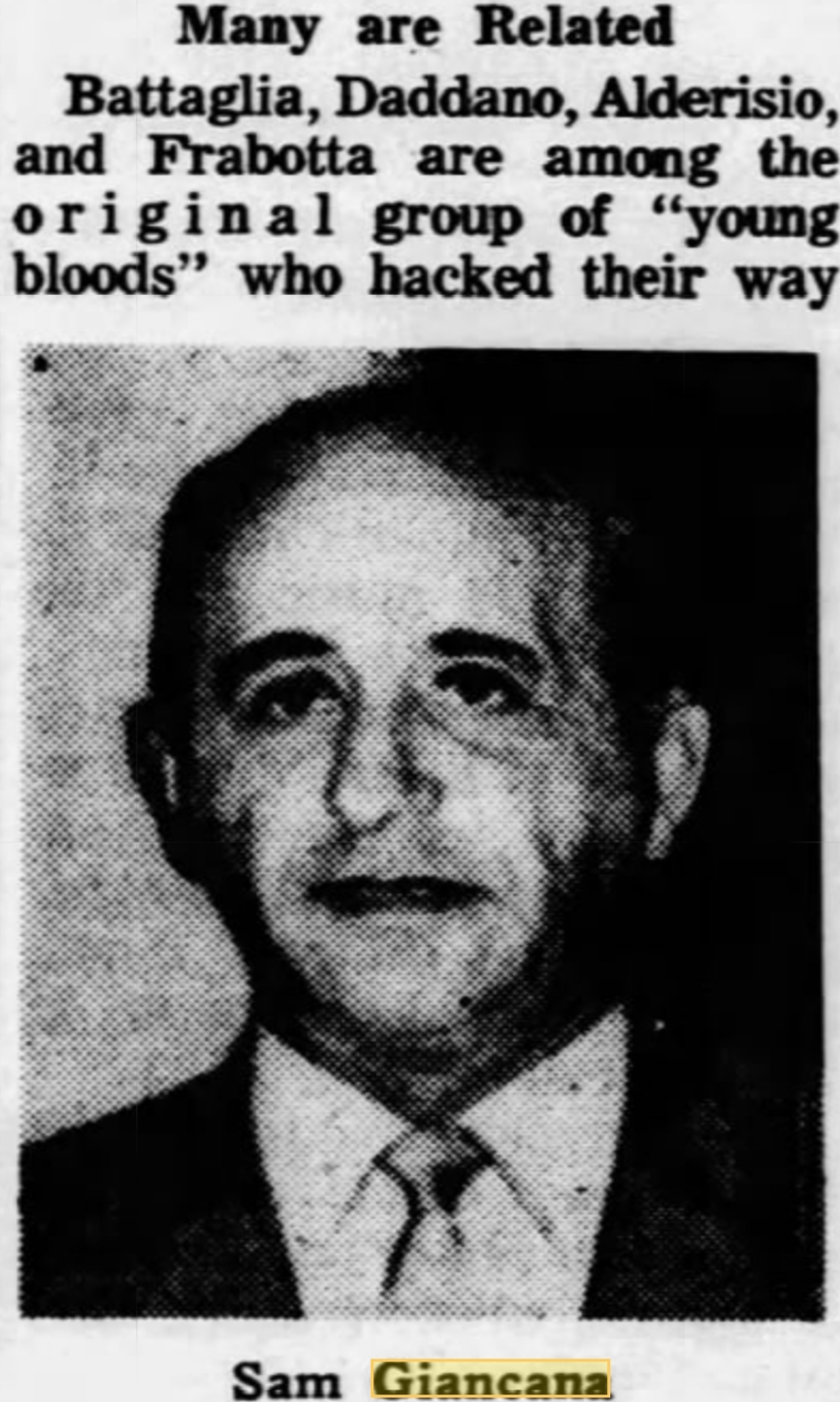
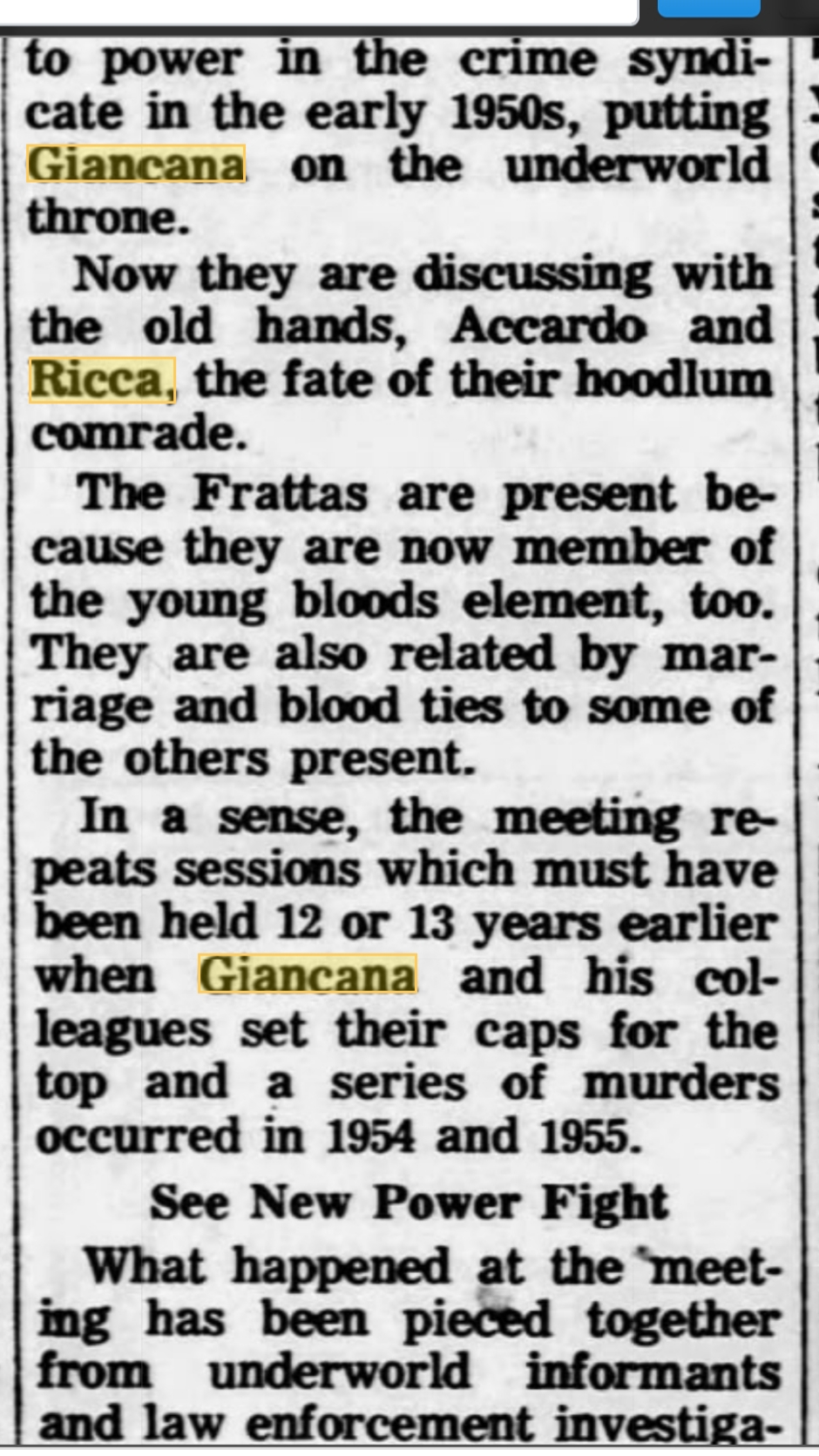
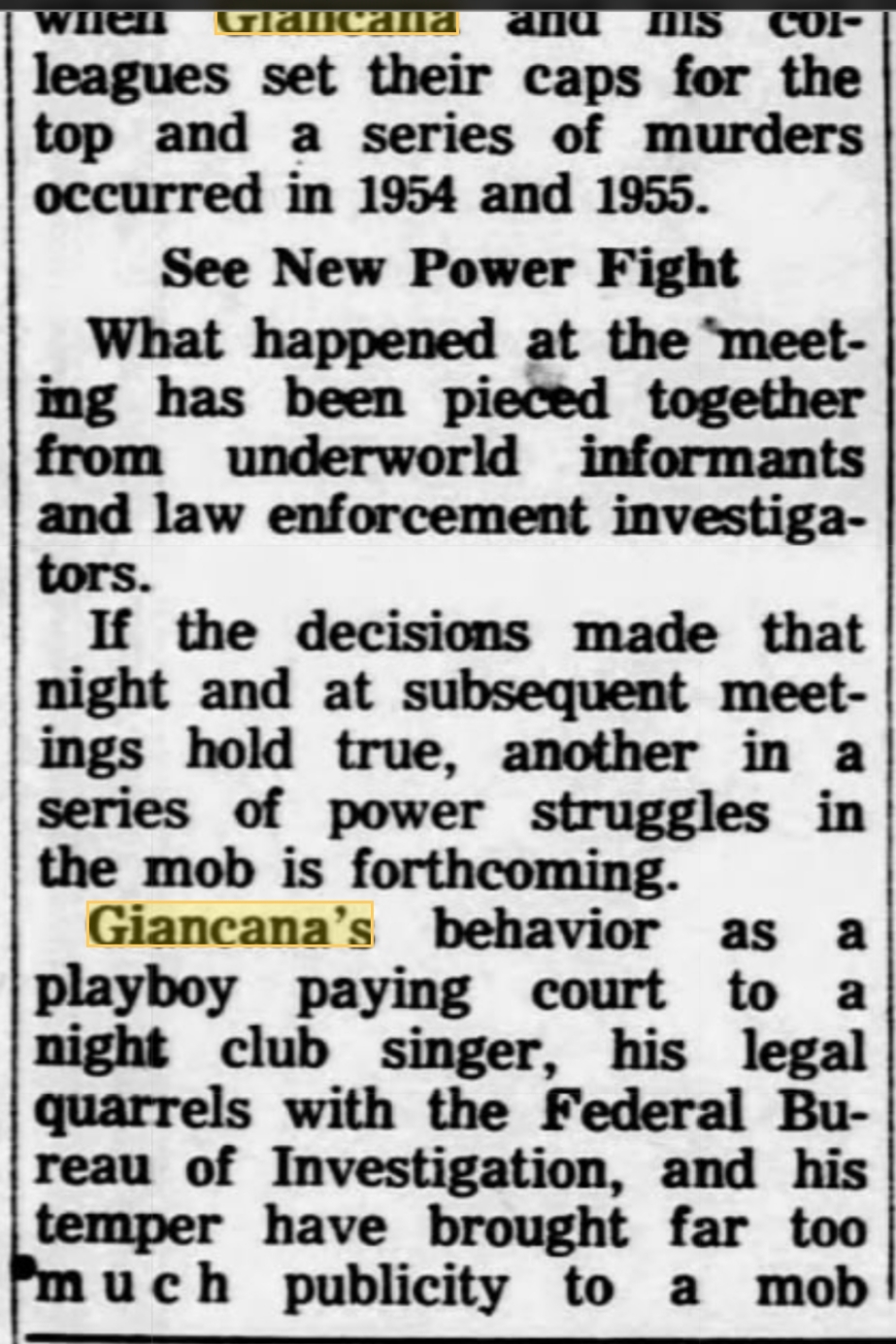
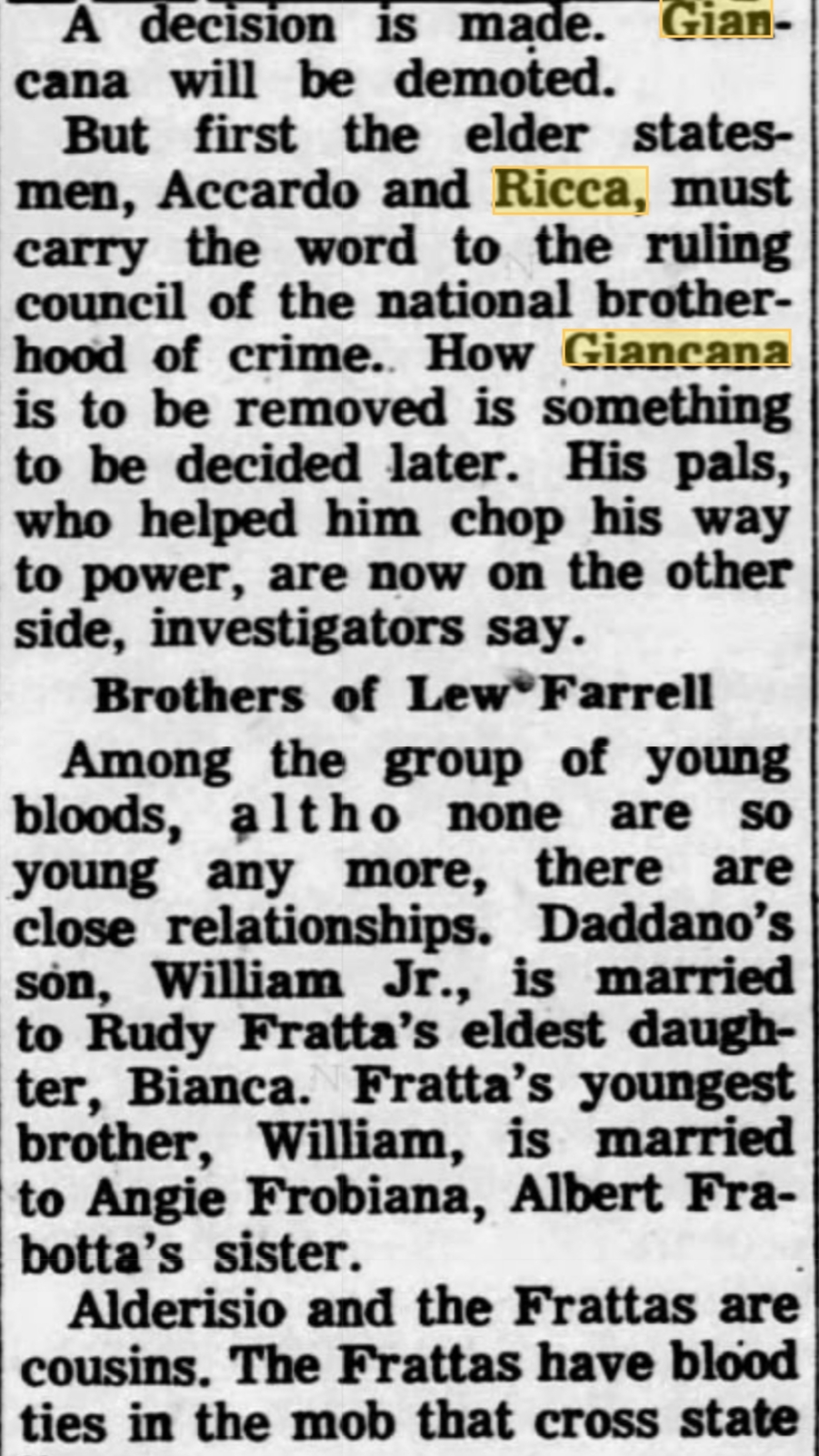
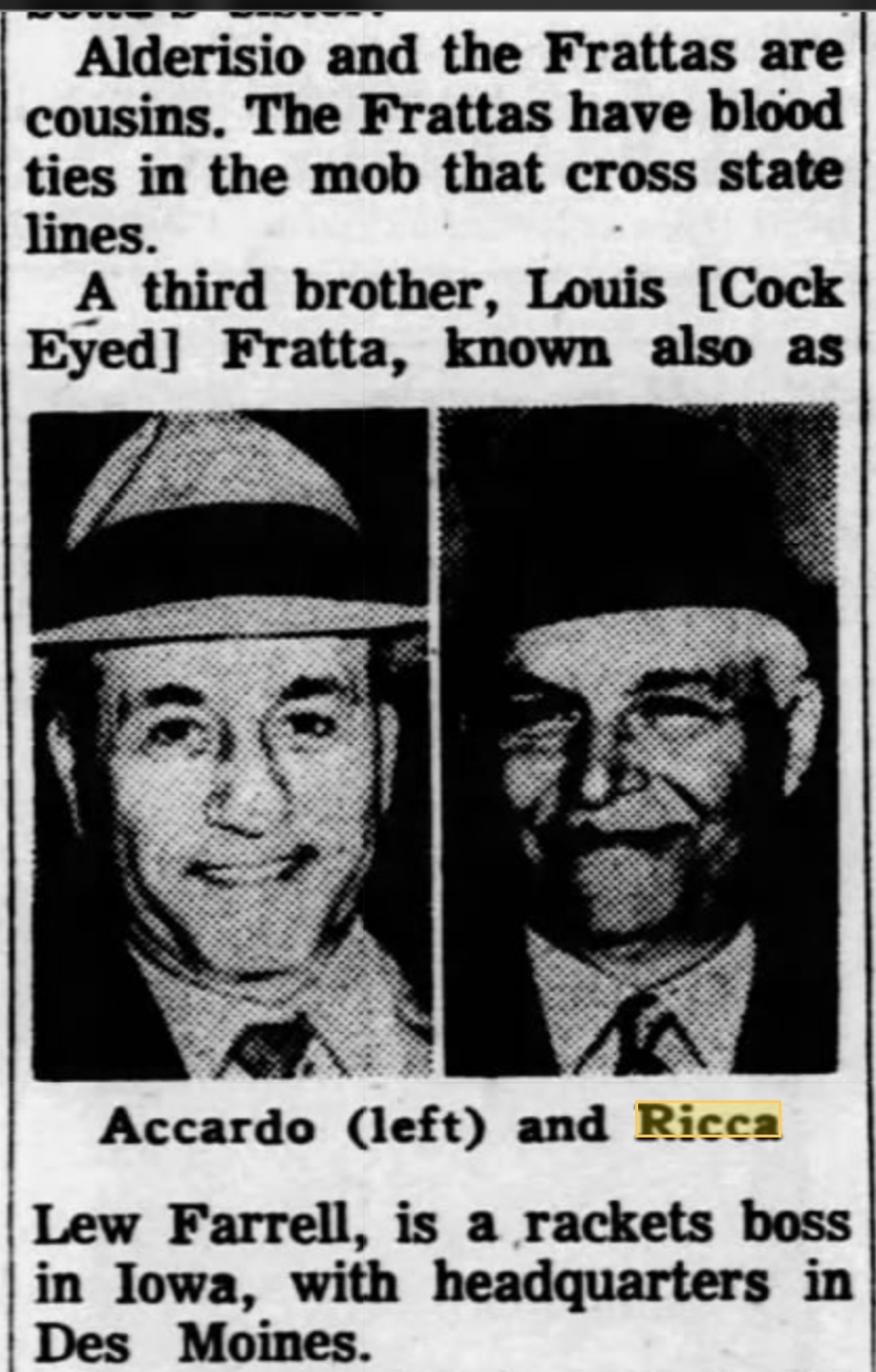
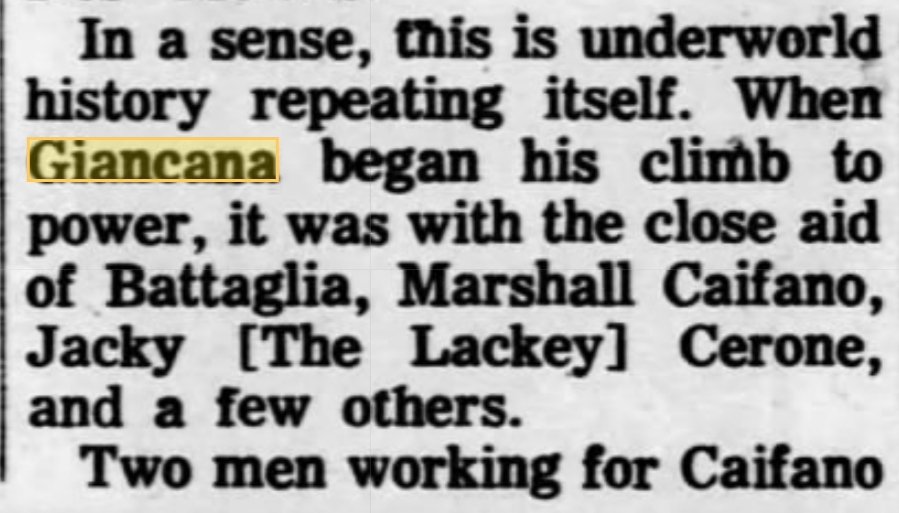
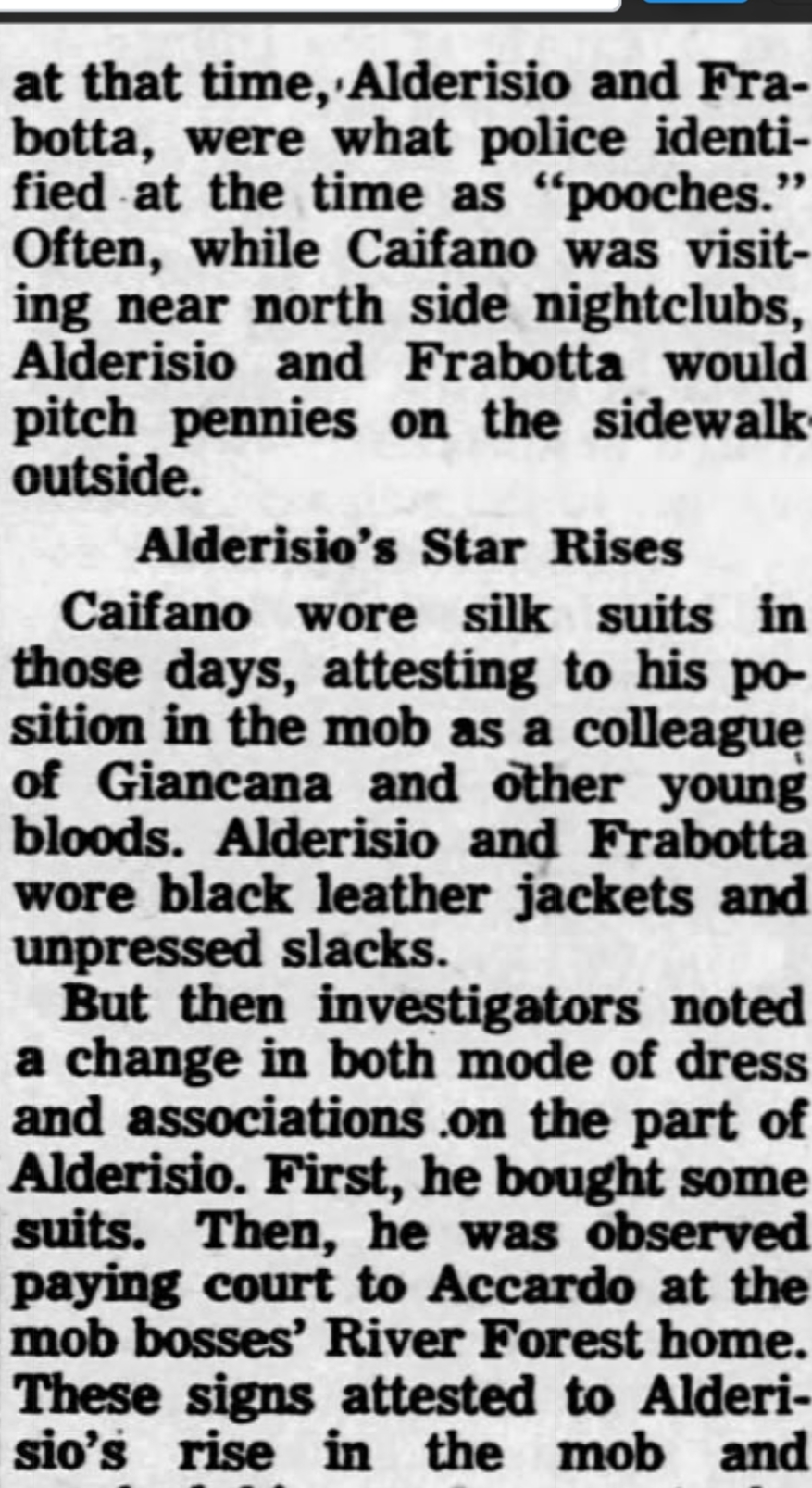
Do not be deceived, neither the sexually immoral, nor idolaters, nor adulterers, nor men who practice homosexuality, nor thieves, nor the greedy, nor drunkards, nor revilers, nor swindlers will inherit the kingdom of God - Corinthians 6:9-10
Re: Understanding Chicago
During the mid 60s, while being under the Outfit, Roselli wanted to become to boss of LA fam so it is possible that he previously held some high position within that same family. But the thing was that Roselli had many problems at the time with his own people in the Chi Outfit regarding the conflict with the Detriot fam. The Outfits bosses thought that it was Rosellis fault for not receiving 15 points from the Detriot fam regarding Frontier in Vegas.B. wrote: ↑Mon May 18, 2020 11:42 pm Baby birds survive because their mothers regurgitate food into their mouths. Everything has its place in nature and everything has its place in this thread, especially if we're going to outpace the Buffalo-Ontario thread. We have at least a few baby birds on the board who might enjoy the discussion. I've enjoyed it, too, and both you and Villain have contributed to that. Love it up.
--
There was a Lucchese made member who began cooperating with the FBI relatively early and appears to have been a longtime member. He became close to John Roselli in prison in, I believe, the 1940s and maintained a friendship with him over the years. He said Roselli had previously been the underboss of the Los Angeles family. This might be better suited for an LA thread, but I don't believe the LA sources have ever described Roselli as the underboss in LA, though every source agrees he was more or less the most influential member of the family.
Even after Roselli transferred back to Chicago, he was considered more of a leader in the Los Angeles family than the actual boss Desimone and underboss Licata. Members sources say that Roselli was pushed as one of the top figures to become LA boss or even boss of a state-wide California mafia family if a couple of conspiracies had been put into motion. Roselli's legal troubles hampered this, among other factors.
I can't be sure, but I'm not sure the Lucchese source was right about Roselli being underboss in LA. Still, on an operational level, sources like Fratianno, Piscopo, and Fratianno all agree that Roselli had the stature of a powerful underboss, even a boss, when he was technically "just" a soldier. Even as a Chicago soldier. An example, too, of how influence and stature don't always correspond to formal rank.
On top of that Roselli had some troubles with the law at the time which made his situation even worse, and he even tried to extort Moe Dalitz which was a huge "no, no". When Giancana left the country, the bosses decided to cancel Rosellis high and direct position to the boss, and placed him under LaPorte, who in turn was the Chicago Heights major capo at the time and also the Outfits main emissary on the West Coast.
Do not be deceived, neither the sexually immoral, nor idolaters, nor adulterers, nor men who practice homosexuality, nor thieves, nor the greedy, nor drunkards, nor revilers, nor swindlers will inherit the kingdom of God - Corinthians 6:9-10
Re: Understanding Chicago
Some ideas to consider based on other boss elections:
- "Campaigning" is forbidden, but it is done behind the scenes, both by the nominees and especially their supporters.
- Elections are sometimes secretly pre-decided, both by the Commission and influential members, so that everyone votes unanimously.
- Even when bosses are elected unanimously, some captains/members secretly oppose the boss but go through the motions.
- Once the boss is elected by the membership, he must be confirmed by the Commission.
- Sal Vitale said the consigliere must be the one who announces the nominee(s) before the vote is taken.
- The Commission sometimes chooses an acting boss, especially when a family has had issues, who is then "coincidentally" voted in.
There is def reason to believe the protocol was and is ignored behind the scenes but we have enough examples to know there were certain guidelines they were supposed to follow (on the surface if nothing else). No clue how it applies to Chicago, though they would have been influenced by this process to some degree given the Commission was involved in all national boss elections.
- "Campaigning" is forbidden, but it is done behind the scenes, both by the nominees and especially their supporters.
- Elections are sometimes secretly pre-decided, both by the Commission and influential members, so that everyone votes unanimously.
- Even when bosses are elected unanimously, some captains/members secretly oppose the boss but go through the motions.
- Once the boss is elected by the membership, he must be confirmed by the Commission.
- Sal Vitale said the consigliere must be the one who announces the nominee(s) before the vote is taken.
- The Commission sometimes chooses an acting boss, especially when a family has had issues, who is then "coincidentally" voted in.
There is def reason to believe the protocol was and is ignored behind the scenes but we have enough examples to know there were certain guidelines they were supposed to follow (on the surface if nothing else). No clue how it applies to Chicago, though they would have been influenced by this process to some degree given the Commission was involved in all national boss elections.
Re: Understanding Chicago
I agree. When the boys in NY heard about Giancanas problems, they thought that Ferraro, the underboss, was going to take his place, according to the protocol. The problem was that Ferraro died that same year of cancer and so everything fell on Battaglia, the major West Side capo at the time. Previously or when Giancana became the boss, many records show that some of the old guys in Chicago and around the country thought that Battaglia shouldve received that same position instead of Momo, mainly because Battaglia allegedly held more weight and was made 8 years before Giancana. Battaglia was probably made by Capone in 1931, while Giancana was made right before going to prison or in 1939. Giancanas sponsors were Nitto and Campagna and his "Godfather" was obviously Ricca, while Battaglias was Al himself.B. wrote: ↑Tue May 19, 2020 2:02 am Some ideas to consider based on other boss elections:
- "Campaigning" is forbidden, but it is done behind the scenes, both by the nominees and especially their supporters.
- Elections are sometimes secretly pre-decided, both by the Commission and influential members, so that everyone votes unanimously.
- Even when bosses are elected unanimously, some captains/members secretly oppose the boss but go through the motions.
- Once the boss is elected by the membership, he must be confirmed by the Commission.
- Sal Vitale said the consigliere must be the one who announces the nominee(s) before the vote is taken.
- The Commission sometimes chooses an acting boss, especially when a family has had issues, who is then "coincidentally" voted in.
There is def reason to believe the protocol was and is ignored behind the scenes but we have enough examples to know there were certain guidelines they were supposed to follow (on the surface if nothing else). No clue how it applies to Chicago, though they would have been influenced by this process to some degree given the Commission was involved in all national boss elections.
Last edited by Villain on Tue May 19, 2020 5:37 am, edited 1 time in total.
Do not be deceived, neither the sexually immoral, nor idolaters, nor adulterers, nor men who practice homosexuality, nor thieves, nor the greedy, nor drunkards, nor revilers, nor swindlers will inherit the kingdom of God - Corinthians 6:9-10
Re: Understanding Chicago
I've alway thought Battaglia was one of the most interesting of the golden age Outfit heavyweights.
Re: Understanding Chicago
Same thoughts here....possibly followed by Prio
Do not be deceived, neither the sexually immoral, nor idolaters, nor adulterers, nor men who practice homosexuality, nor thieves, nor the greedy, nor drunkards, nor revilers, nor swindlers will inherit the kingdom of God - Corinthians 6:9-10
Re: Understanding Chicago
Probably because Melrose was arguably the biggest hotspot for Outift guys, up there with Cicero for sure.
Re: Understanding Chicago
I agree MP was one of the Outfits main strongholds from the 1950s until the mid 2000s. Cicero was their stronghold since 1931, while the area between W Grand and Taylor St was the the first one, especially for the old Chicago Mafia.
Do not be deceived, neither the sexually immoral, nor idolaters, nor adulterers, nor men who practice homosexuality, nor thieves, nor the greedy, nor drunkards, nor revilers, nor swindlers will inherit the kingdom of God - Corinthians 6:9-10
Re: Understanding Chicago
Thanks obviously as we have seen some “news” can not have their facts straight I was wondering if there was a wiretap or something. I think it’s possible accardo and Ricca elected a boss but not a straight up vote. Also not split hairs but when aiuppa was made boss in 1970 ricca was senile at that point so I would say that was solely accardo. As I talked before about accardo aiuppa and cerone my personal take is they operated as a team not the true boss front boss theory and I believe accardo and ricca operated as one too. But I get your general point because ina. Disagreement I think accardo would defer to ricca so you could say he was the final say if you wanted. But again overall I ascribe to the working as a group theoryVillain wrote: ↑Tue May 19, 2020 1:10 amPete wrote: ↑Mon May 18, 2020 10:28 pmDisagree with you bud. Accardo picked every boss after him until carlisi, battaglia, Milwaukee phil, cerone, aiuppa, we’re all accardo. Of course unless you have something to prove me wrong and I’m not being an ass I’m being serious you are very researched and I learn stuff from you among others
Ps not trying to start a pogo/wiseguy love affair Just giving props to people that actually do research instead of people that regurgitate stuff that was proven wrong years ago
its ok bud and thanks

You are forgetting by that time Ricca was the top boss not Accardo. Some time ago we had a discussion about this...
viewtopic.php?f=29&t=3797&p=86757&hilit=Giancana#p86757
Heres some additional stuff....

I agree with phat,I love those old fucks and he's right.we all got some cosa nostra in us.I personnely love the life.I think we on the forum would be the ultimate crew! - camerono
Re: Understanding Chicago
Are there any specific stories about someone's membership seniority being important in Chicago, re: the bolded part? I'd be very interested in that.Villain wrote: ↑Tue May 19, 2020 3:13 am I agree. When the boys in NY heard about Giancanas problems, they thought that Ferraro, the underboss, was going to take his place, according to the protocol. The problem was that Ferraro died that same year of cancer and so everything fell on Battaglia, the major West Side capo at the time. Previously or when Giancana became the boss, many records show that some of the old guys in Chicago and around the country thought that Battaglia shouldve received that same position instead of Momo, mainly because Battaglia allegedly held more weight and was made 8 years before Giancana. Battaglia was probably made by Capone in 1931, while Giancana was made right before going to prison or in 1939. Giancanas sponsors were Nitto and Campagna and his "Godfather" was obviously Ricca, while Battaglias was Al himself.
In the late 1950s, Angelo Bruno was the Commission's preferred candidate to take over Philadelphia and he did have support within the family, but there was an element of older members who felt he hadn't been a member long enough (Bruno was made at the earliest in 1951, which he was recorded discussing). Ultimately it didn't matter, as Bruno was the boss for twenty years but his lack of seniority still came up.
In other examples though we see few concerns over this type of thing. Joe Bonanno was likely made in the late 1920s and became boss within a few years. Anthony Lima was inducted in Pittsburgh in 1927 and took over as San Fran boss a few years later. Of course Capone was made around 1928 and became boss in 1931. Promotions to captain are a much bigger can of worms, as Valachi said Tony Bender Strollo was promoted to captain very quickly after being made, and he had a huge, influential decina under him. Even looking at Sicily, Nino Giuffre was made in the early 1980s and within a matter of years he was the acting boss and acting capomandamento of Caccamo meeting directly with Provenzano and Riina.
I use the earlier examples rather than someone who became boss "instantly" in the 1990s like Ralph Natale (although that's part of the conversation, too), because it shows that even the older traditional mafia didn't care so much about seniority as much as they did capability once someone was made. A good way to explain it might be, if someone is good enough to be made, they are potentially good enough to hold any position in the family. I'd be very curious what you've found on Chicago, as they seem to have favored capability over formality in many cases (as evidenced by non-Italians having stature/influence), but if Giancana's lack of seniority compared to Battaglia was controversial that would show that at least some members did care about seniority.
And seniority does come up as an issue in various families. People in the Milwaukee family were upset about Frank Balistrieri becoming boss, so John Alioto (former boss) became a capodecina and the older members reported directly to him. We've heard of other misgivings, where members felt a senior member was passed over. But this seems to be the exception, as I think the mafia generally favors capability over seniority. Giancana was obviously very capable, at least at the time he became boss.